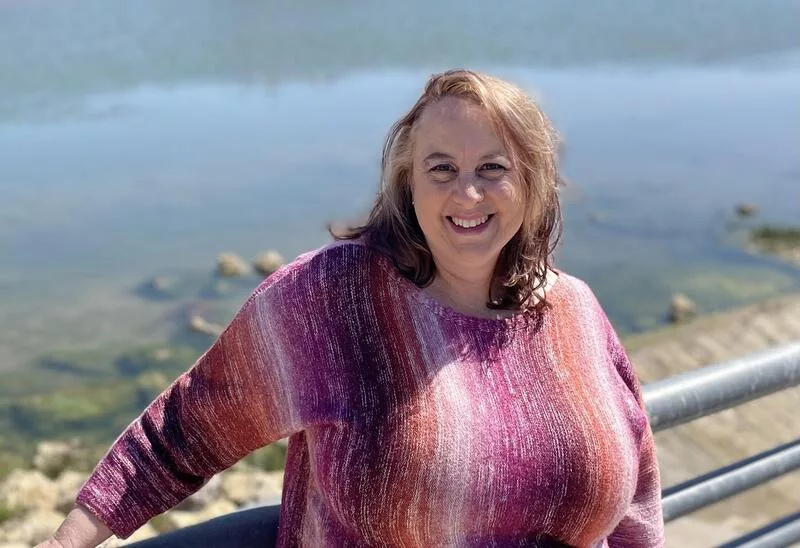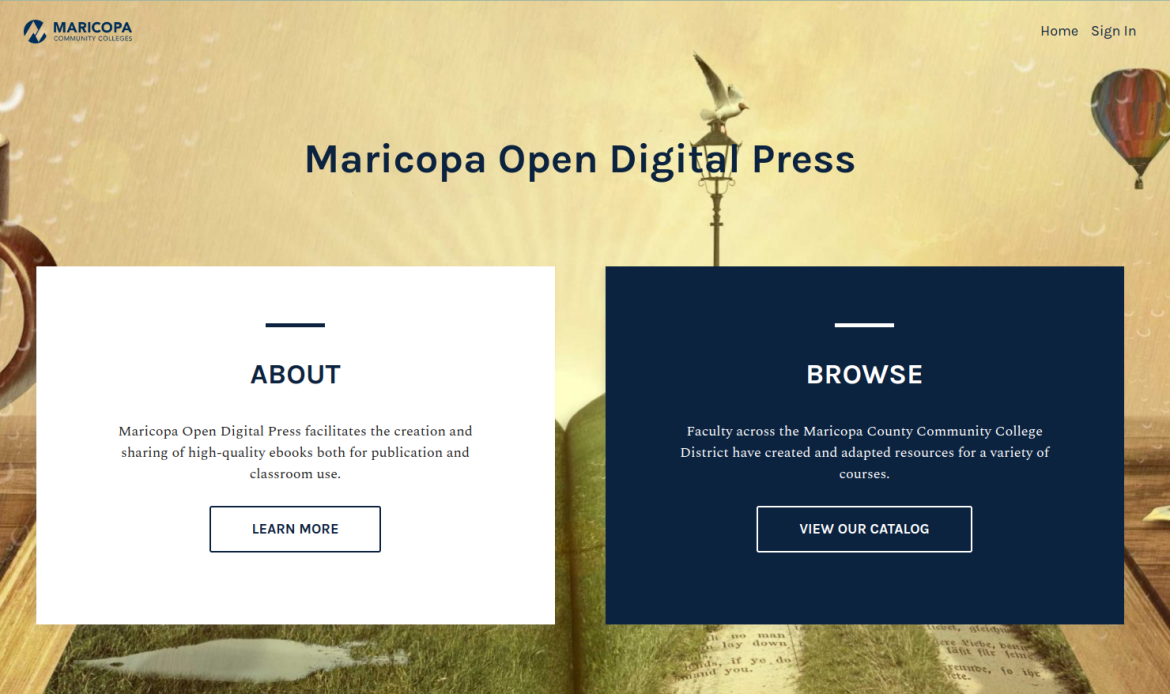Growing the impact of a trail-blazing program to lower the cost of education and improve the quality of learning materials
Quick Facts
• Consortium of 10 community colleges in Maricopa County, Arizona
• Serving over 80,000 students per year
• Pressbooks client since January 2020
• 400+ books published with Pressbooks as of July 2023
• Over 2700 Pressbooks users
• Home of Open Maricopa, a visionary program that has successfully lowered the cost of education for MCCCD students
Maricopa Community College District’s Pressbooks story in brief
Download the PDF version of this story
The challenge
Part 1: Make education more affordable for MCCCD students by empowering highly engaged faculty from 10 community colleges to publish and share low or no-cost learning materials.
Part 2: Increase the impact of Open Maricopa by attracting more faculty to create and adapt high-quality open educational resources (OER) and ebooks both for publication and classroom use.
The solution
In 2013, MCCCD launched the Maricopa Millions initiative (now Open Maricopa), which sought to promote textbook affordability through the use of OER across its 10 colleges. This visionary effort established MCCCD as a leader in the open education movement to create more affordable and inclusive learning environments.
MCCCD expanded the success of Open Maricopa by introducing Maricopa Open Digital Press and publishing hundreds of high quality digital books that can be accessed and adapted by anyone. Choosing Pressbooks to help realize this next-level vision, MCCCD gained a user-friendly platform to showcase and share the impressive amount of no-cost learning materials developed by faculty, staff, and even students.
Having digital content presented in a professional, interactive book format encouraged more faculty to adopt and adapt books created by peers. It also opened opportunities to collaborate on new publishing projects.
The impact

No-cost books on MCCCD’s Pressbooks network have been downloaded 96,000+ times, representing considerable reach for works created by their faculty and millions in textbook cost savings for students. But what makes many MCCCD books special is the way authors have used interactivity to improve the learning experience. Over a quarter of their 400+ books include interactive elements like quizzes, image hotspots, and interactive video. By encouraging creators to build accessible interactivity into their learning materials, MCCCD recognizes the power of digital books to engage students through practice, feedback and formative assessment.
“Anything that improves student learning is something I’m proud of,” says Dr. Debbie Baker, the OER Coordinator who also serves as an instructional designer and Pressbooks network manager at MCCCD. “Helping students succeed with better and more accessible learning materials is something for our faculty to be proud of too.”
The how: Inside MCCCD’s use of Pressbooks
Introducing Pressbooks to increase participation
Early on, MCCCD leaders recognized the untapped potential of collaboration across multiple colleges to develop and share learning materials tailored to their students and programs. With Pressbooks, MCCCD removed hurdles to collaboration by aligning around one easy-to-use publishing platform where authors and creators can write, edit, and work together on scholarly and academic publishing projects. The truly visionary leap was to use this alignment to generate more interest in Open Maricopa and increase the visibility and impact of their established publishing program.
Pressbooks Directory, an index that includes thousands of open access books published by hundreds of organizations using Pressbooks’ platform, made it easy to introduce Pressbooks to faculty across all 10 colleges in MCCCD. Baker and her team showed off the Directory, demonstrating how easy it is to discover new content. “From there it takes just a few clicks to clone a book into the authoring platform and make it your own,” said Baker in an interview with Pressbooks. Faculty and staff appreciated how easy it was to get started on new projects using openly licensed work they could adapt for their needs. Since introducing Pressbooks, over 2,700 users have worked on Maricopa Open Digital Press publishing projects.
Cross-college collaboration
MCCCD is made up of 10 separately accredited colleges, each with its own motivations, resource allotment, and technical know-how. To organize these colleges around Open Maricopa’s publishing goals, MCCCD took a train-the-trainer approach. Each college has their own Pressbooks network manager (a person responsible for the administration of Pressbooks at an institution), trained by district level staff to build awareness and support creators and departments using Pressbooks on their campus. This structure helps facilitate collaboration within a college, between colleges, and at the district level. It also allows individual colleges to troubleshoot their own issues autonomously.
According to MCCCD leaders, one of the greatest benefits of Pressbooks for a multi-institution system like theirs is in how it provides a common digital space to house and showcase scholarly collaborations. Among Open Maricopa’s best works are books developed with cross-institutional input to incorporate diverse expertise and perspectives. “When multiple people come together to create the work, multiple people are invested in it, are proud of it, and want to continue to improve it,” said Baker, speaking about the creative synergy between MCCCD colleges.
The growth and future of the MCCCD-Pressbooks partnership
MCCCD and Pressbooks began their relationship in the early days of the COVID-19 pandemic and have achieved great things despite adversity. MCCCD seized the opportunity to introduce a digital publishing tool to faculty looking to improve the online learning experience. Now they are in an excellent position to grow their efforts and continue demonstrating leadership in open education. Use of Pressbooks has grown in Maricopa since those early days, but there’s still more to do. Next up, Baker would like to see more college staff, like graphic designers, developers, instructional designers, communications specialists and more, using the tool to meet a variety of digital publishing needs including teaching, learning, and beyond.
Advice from the field: Debbie Baker on rollout strategies
Looking back on her experience introducing Pressbooks to faculty, Baker reflected on the need for a rollout strategy that is holistic. By holistic, she means the strategy should account for the great variety of needs faculty might have for a publishing tool. They may want to create an ebook, a workbook, OER, or a collection of course material. Baker recommends listening to what faculty envision for their projects, showcasing examples, and suggesting ways Pressbooks can work for them. If multiple people with a variety of needs and visions work in the same tool, they can learn together and share successes, thus increasing the effectiveness of the tool and the capacity of the users.
Book spotlight
Nutrition Essentials by Stephanie Green and Kelli Shellal is rich with interactive activities that allow students to check their understanding as they progress through the material. Check out this early chapter, “Food for all,” for an example of how text can be improved with interactive elements, video, and color coded text boxes to make it more engaging for learners.
